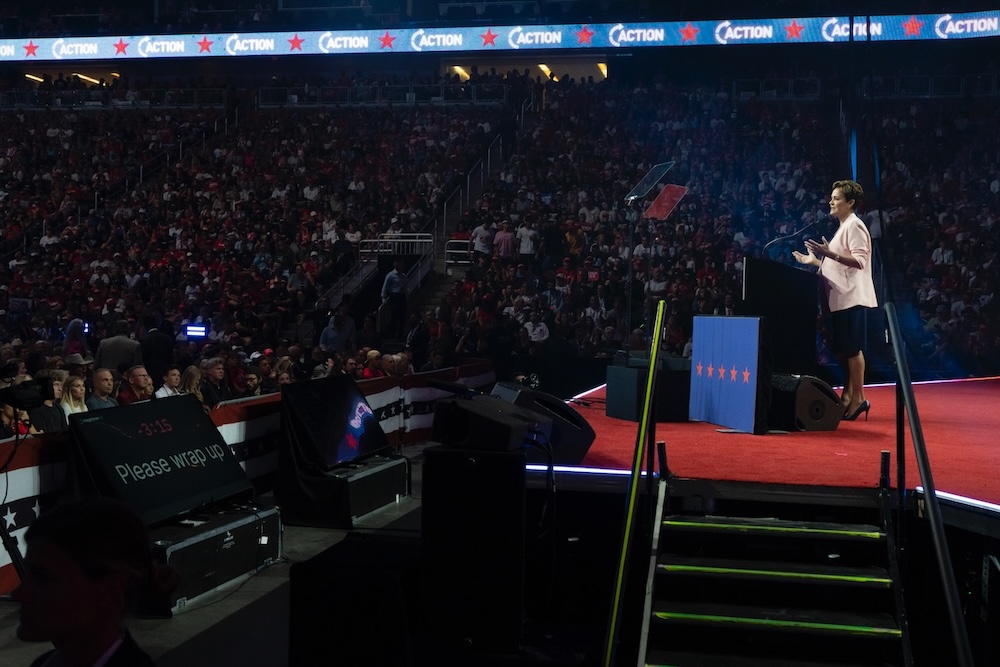Journalists and media experts in these states are highly concerned about the media's dire economic situation, a lack of responsiveness from government officials, and growing hostility from local political leaders.
This statement was originally published on rsf.org on 29 October 2024.
As the U.S. presidential election looms, Reporters Without Borders (RSF) has released a new report analyzing four key swing states — and found that none are a model of press freedom. Journalists and media experts in these states are highly concerned about the media’s dire economic situation, a lack of responsiveness from government officials, and growing hostility from local political leaders. RSF is calling for specific measures by lawmakers to address these shortcomings, as well as implementation of a broader advocacy plan to strengthen the climate for journalism across the country.
Read the report: Press Freedom in the Swing States: The Climate for U.S. Journalism Ahead of the 2024 Election
In 2024, the United States ranked 55th in RSF’s World Press Freedom Index, dropping 10 spots from the year before. RSF’s new report “Press Freedom in the Swing States: The Climate for U.S. Journalism Ahead of the 2024 Election” examines the press freedom climates in four key swing states ahead of the 2024 presidential election. The report examines the situation in Arizona, Florida, Nevada and Pennsylvania across five categories — political, legal, socio-cultural, economic, and safety — using a survey completed by journalists and media experts in each state.
According to the report, in those four states :
- Survey respondents were nearly unanimous (94%) in their assessment that public officials stall or ignore public records requests.
- 66% of journalists and media experts agreed that it was “difficult to earn a living wage as a journalist.”
- 75% agreed that “the average media outlet struggles for economic viability.”
The full report is available via download.
“RSF’s report shows journalists and media experts in swing states have serious concerns about their industry as we approach the 2024 election – economic worries, increasingly vicious political attacks, stonewalling by public officials, and more. There can be no democracy without press freedom, so it’s critically important to understand the issues confronting the news media in the places that are most pivotal in American presidential elections. RSF hopes that this report will provide a starting point for all Americans to demand improvements in their states’ media ecosystems: greater transparency, better access to information, and a marketplace that enables journalism to thrive.”
Clayton Weimers, Executive Director, RSF USA
The RSF report also reveals that :
- Nevada received the highest marks across the board.
- Arizona has the worst political score of the four states analyzed, a reflection of anti-media hostility from local political officials.
- Florida’s status as a massive news desert directly impacts the state’s press freedom climate, with over 300,000 Floridians lacking a local news source. The state also lacks a press shield law and its anti-SLAPP law is very vague, leaving journalists open to risks.
- Pennsylvania media outlets struggle economically and journalists are unable to earn a living wage. They also face some of the most hostility from the public and elected officials.
RSF’s recommendations
This report reveals a number of shortcomings holding back press freedom in these four states. Some of these issues can be addressed through policy reforms. Lawmakers in all four states should commit to strengthening media access to public records by ensuring adequate funding and staffing levels in the offices tasked with responding to public records requests; establishing simple, coherent processes with clearly articulated timelines; improving training for officials tasked with processing and responding to these requests – including training specific to working with journalists and media outlets; and leading by example at the political level to encourage a culture of transparency.
The worsening economic conditions of news are another dominant concern in this report. The spread of news deserts is deeply problematic for the democratic capacity of every state — not just the swing states surveyed here. Many states are experimenting with new policies and models for funding local journalism. No one model will present a one-size-fits-all solution. Instead, state legislatures must find ways to innovate new models, such as increased public funding, tax rebates for news subscriptions, and policies that ensure social media companies properly compensate the news media for using their content.
The report findings further underscore the need for American political leaders to do more to strengthen press freedom. RSF’s 10-point plan for press freedom identifies ways the next presidential administration can improve press freedom and restore America’s place as a global leader in this area, and has urged both presidential candidates to implement it once elected.



